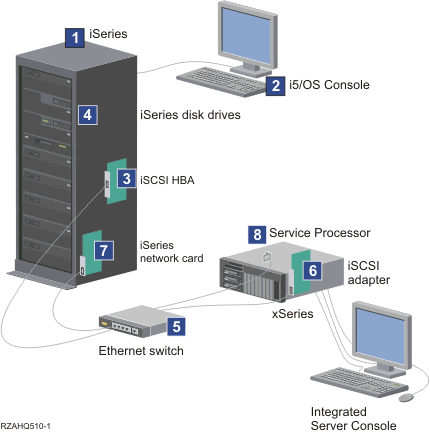
iSCSI attached servers
 Typical iSCSI attached IBM® xSeries® or BladeCenter™ server
installation
Typical iSCSI attached IBM® xSeries® or BladeCenter™ server
installation
 iSCSI attached servers are standard xSeries or IBM BladeCenter server
models that have processors, memory, and expansion cards, but no disks. All
of the disk space is in the iSeries™ server and managed in the same way
as for IXS and IXA models.
iSCSI attached servers are standard xSeries or IBM BladeCenter server
models that have processors, memory, and expansion cards, but no disks. All
of the disk space is in the iSeries™ server and managed in the same way
as for IXS and IXA models.
 The installation procedure for an iSCSI attached integrated
Windows server requires hardware to be installed and configured in the iSeries and xSeries or IBM BladeCenter servers. As in the IXA, the iSCSI
HBA attached xSeries servers have their own expansion slots, so additional
options can be installed to expand the capabilities of the server.
The installation procedure for an iSCSI attached integrated
Windows server requires hardware to be installed and configured in the iSeries and xSeries or IBM BladeCenter servers. As in the IXA, the iSCSI
HBA attached xSeries servers have their own expansion slots, so additional
options can be installed to expand the capabilities of the server.
 The following graphic illustrates
a typical iSCSI HBA installation:
The following graphic illustrates
a typical iSCSI HBA installation:
 Figure 4. A typical iSCSI attached server or IBM BladeCenter installation
Figure 4. A typical iSCSI attached server or IBM BladeCenter installation


- You need a compatible iSeries. See Hardware requirements for
compatibility information.
- The i5/OS™ console, from which you connect to the iSeries using iSeries Navigator or the character-based interface, is shown to make clear the
distinction between it and the Windows console.
- Depending on the type of the physical network, copper or fiber iSCSI HBAs
are available. This iSCSI adapter serves as the target device and connects
to an Ethernet network using standard Ethernet cables.
- An integrated server does not have its own hard disk drive. i5/OS emulates hard
disk space for it to use from iSeries hard disk drive. These drives and other iSeries storage devices are accessed through the iSCSI HBA.
- The iSCSI HBA network cables are connected to a standard Gigabit Ethernet
switch.
- An additional iSCSI HBA is required in the xSeries server. This adapter provides the
connection to the iSCSI HBA for iSeries. This adapter can be viewed from the xSeries server as the storage adapter, where the disks are found across
the network.
- A typical iSeries server will have a network card. An iSeries LAN connection
is required by IBM Director to discover and manage the remote xSeries or IBM BladeCenterCenter
servers.
- A service processor allows the iSeries server to discover and manage the remote
system. The service processor may be a remote supervisor adapter (RSA II),
a Baseboard Management Controller (BMC), or a Management Module of an IBM BladeCenter. The RSA II, BMC, or Management Module is connected to the iSeries server over an Ethernet network.

For additional hardware information check the IBM iSeries Integrated xSeries solutions
 web
site.
web
site.
(www.ibm.com/servers/eserver/iseries/integratedxseries)

 Typical iSCSI attached IBM® xSeries® or BladeCenter™ server
installation
Typical iSCSI attached IBM® xSeries® or BladeCenter™ server
installation

 Typical iSCSI attached IBM® xSeries® or BladeCenter™ server
installation
Typical iSCSI attached IBM® xSeries® or BladeCenter™ server
installation
 iSCSI attached servers are standard xSeries or IBM BladeCenter server
models that have processors, memory, and expansion cards, but no disks. All
of the disk space is in the iSeries™ server and managed in the same way
as for IXS and IXA models.
iSCSI attached servers are standard xSeries or IBM BladeCenter server
models that have processors, memory, and expansion cards, but no disks. All
of the disk space is in the iSeries™ server and managed in the same way
as for IXS and IXA models.
 The installation procedure for an iSCSI attached integrated
Windows server requires hardware to be installed and configured in the iSeries and xSeries or IBM BladeCenter servers. As in the IXA, the iSCSI
HBA attached xSeries servers have their own expansion slots, so additional
options can be installed to expand the capabilities of the server.
The installation procedure for an iSCSI attached integrated
Windows server requires hardware to be installed and configured in the iSeries and xSeries or IBM BladeCenter servers. As in the IXA, the iSCSI
HBA attached xSeries servers have their own expansion slots, so additional
options can be installed to expand the capabilities of the server.
 The following graphic illustrates
a typical iSCSI HBA installation:
The following graphic illustrates
a typical iSCSI HBA installation:
 Figure 4. A typical iSCSI attached server or IBM BladeCenter installation
Figure 4. A typical iSCSI attached server or IBM BladeCenter installation




 web
site.
web
site.
